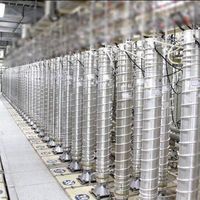Nuclear Deal Not Enough For Iran's Trade Without FATF Accession
Experts say Iran's international trade will continue to suffer without accession to the money-laundering watchdog (FATF) rules, even if US sanctions are lifted.
Unlike his predecessor Hassan Rouhani, President Ebrahim Raisi and his hardliner supporters do not favor accession to the Paris-based Financial Action Task Force (FATF). Raisi in September criticized the previous administration for insisting on joining the FATF conventions and suggested that his government might prefer to focus on relations with "neighbors and friendly countries," including presumably China and Russia.
Critics of FATF have until now argued that accession would make Iran vulnerable to US sanctions and would curb its ability to support proxy forces, such as Hezbollah in Lebanon, which has also faced US sanctions.
Iran has been on the FATF blacklist, along with North Korea, since February 2020 for failing to pass legislation introducing transparency measures designed to combat money-laundering, corruption, and financing of ‘terrorism.’ FATF members – who host most of the world’s financial centers – are required to undertake enhanced diligence and countermeasures against blacklisted states.
Hardliner supporters of Supreme Leader Ali Khamenei have blocked bills approved by parliament since 2018 to be ratified by a constitutional watchdog.
Experts say with an agreement with world powers in sight to restore the 2015 nuclear deal, Joint Comprehensive Plan of Action (JCPOA), and the lifting of US sanctions, the thorny issue of accession to the FATF must be resolved urgently.
In a commentary entitled "FATF's Future After JCPOA Revival" in Tejarat (Commerce) newspaper on March 15, Mohammad Lahouti, head of Iran Export Confederation, argued that without FATF accession, other countries might hesitate to establish trade with Iran, even if US sanctions end with the signing of a nuclear deal. "The issue of FATF has to be resolved if there is a [nuclear] agreement," he wrote.
Financial and banking expert BahaoddinHashemi says even second and third-rate foreign banks will not deal with black-listed Iranian banks even if Iran improves its relations with world powers after the restoration of the JCPOA, to avoid coming under suspicion of money laundering.
"[Being on the blacklist] of the FATF is one of the most important hurdles in the way of economic relations and attracting [foreign] investment," Hashemi wrote on March 15 in Samt– a newspaper that focuses on issues related to industries, mining, and trade.
Hardliners supporting Supreme Leader Ali Khamenei and the Revolutionary Guard say Iran should “Look East” and build closer ties with China and Russia as a counterweight against the United States and conduct trade with those countries, avoiding dollar transactions as much as possible.
But failure to resolve the FATF issue would be detrimental to international economic relations even with China and Russia, experts say. FATF is a multilateral organization and whether a country trades in US dollars or not, its financial transparency rules still apply.
The FATF blacklist carries with it no formal sanctions, but financial institutions shift their resources and services away from blacklisted countries not to risk legal complications.
Former President Hassan Rouhani and his ministers often complained that hardline rivals opposed FATF accession to increase the difficulties his government faced in managing the economy. Iran would be in a better place if an agreement on the nuclear issue and accession to the FATF happened, he said last July at the general assembly of the Central Bank of Iran. Officials in the Rouhani administration and some reformists also accused hardliners of having a vested interest in practices used to circumvent sanctions.








